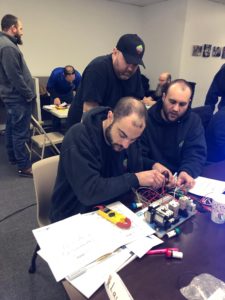What Makes a Good Elevator Mechanic?
 Being an elevator mechanic requires some very specific knowledge, such as licensing, technical training and – obviously – a solid level of safety awareness. However, that’s just the beginning. To deliver the kind of service that employers and customers are looking for, it’s not enough to just understand the inner workings of complex machinery and high-tech components. So, what else do you need? In this blog post we explore what it takes to be a successful and sought-after elevator mechanic.
Being an elevator mechanic requires some very specific knowledge, such as licensing, technical training and – obviously – a solid level of safety awareness. However, that’s just the beginning. To deliver the kind of service that employers and customers are looking for, it’s not enough to just understand the inner workings of complex machinery and high-tech components. So, what else do you need? In this blog post we explore what it takes to be a successful and sought-after elevator mechanic.
The License
In most states, becoming an elevator mechanic is a relatively straight-forward journey. You need to have a license that allows you to carry out elevator service, repair, installation, and inspection – which is either a CET (Certified Elevator Technician) license or the equivalent state license. A typical CET process takes approximately four years to complete, after which you can sit your certification exam.
The Fundamental Skills
All elevator training and apprenticeship programs will cover a wide range of technical skills and procedures that will give you a great foundation to carry out work on elevator equipment. They typically include things like:
- Elevator installation
- Routine maintenance
- Troubleshooting malfunctioning systems
- Repairing or replacing parts
- Conducting tests
- On-site installation of equipment
- Ensuring properly functioning equipment
- Ability to read blueprints, technical manuals, and other technical documents
- Following established safety, maintenance, and testing procedures
- Troubleshooting electrical and mechanical malfunctions
However, while the license training will educate you on how to carry out elevator work safely and accurately, it doesn’t automatically make you a good elevator mechanic. The job involves many elements that require a certain set of skills and traits. Let’s look at a few keys to being a successful mechanic in the elevator industry.
The Personal Qualities
As an elevator mechanic, you will always be part of a team. You’ll be working alongside other mechanics, helpers, internal staff, suppliers, and distributors. What’s more, you will also be interacting with various other people such as customers, contractors, architects, and even the general public. To do this well, a good mechanic will have a range of skills that go beyond just technical expertise. Let’s look at a few examples.
- Safety Focus
Needless to say, safety must be at the absolute forefront of any business operating in the elevator industry, and that same safety focus also needs to trickle down to every employee in the field. A mechanic should never work for a company that doesn’t consistently apply a solid, accredited safety program to all operations and employees. However, on an individual level, a good elevator mechanic will have their own awareness of safety and risk, which they apply to every situation they face. They understand the process of installation, they carry and use personal protective equipment (PPE), and they take the time to conduct a safety assessment before any task – even if they’ve done the task many times before. Safety culture is no accident, and every mechanic needs to have an ingrained safety mindset that keeps themselves safe, as well as their colleagues and the riding public. - Flexibility
A typical working day for an elevator mechanic is often hard to predict. The nature of the job is one of frequent changes and developments, where it’s important to be able to move with the changes and adapt as needed. A good mechanic will always keep themselves updated with the latest information, validating what they know, and make decisions based on the current situation. - Positive Attitude
As in any service role, it’s important to remain positive in interactions with customers and contractors. You’re expected to do everything in your power to keep the client happy, while continuously moving things forward. However, a good mechanic makes sure to escalate any issues to their line manager if they have reached the limit of their own ability to help. - Communication
In any team, communication is key to collaborating successfully. A good mechanic will keep their teammates informed of any important changes to a situation, they will ask for details if they need to know more, and they will keep in touch with any relevant in-house counterparts to report on progress. A modern elevator company will of course offer systems and communications tools to make it easy for everyone to stay in touch and share updates, but even if these systems are available, it’s up to the individual to use them. A good elevator mechanic makes the effort to communicate, clearly and frequently. - Professionalism
All good mechanics know that when they’re out on a job, they’re not representing themselves – they’re representing the business. For many tenants and building managers, the mechanic may be the only interaction they have with their elevator service company, so it’s important to make a good impression. This includes not just your behaviour and your language, but also your physical appearance. A good elevator mechanic will always wear an appropriate uniform, display identification, care for and use their tools properly, and use the relevant PPE for the job. - Willingness to Learn
When working with elevators, especially in an independent elevator company that supports non-proprietary equipment, it’s important to not just keep up to date with the latest technical innovation but also learn from the more seasoned mechanics who have experience of working with older equipment. To be able to service and install different types of equipment, a good elevator mechanic will be on a constant journey of discovery. Elevator’s age, new solutions arrive, and codes get updated; there’s always something to learn.
Other Requirements
There are various other aspects of the mechanic’s job that are important to bear in mind for anyone considering a job in the elevator industry. You will of course need the ability to work at heights, to work around the public, and pass a drug screen to ensure the safety of you and the people around you. Most roles also require a mechanic to have a valid driver’s license so they can drive service vans to and from jobs.
-
Elevator Mechanics Make a Difference
We’ve all heard the saying ‘If something is worth doing, it is worth doing well’, and you could argue that this is particularly relevant for us working in the service industry. Your job as a mechanic makes a difference in the lives of people every single day, as you have the power to help keep people, buildings, even entire cities, moving. It’s a rewarding and interesting job – and it’s certainly worth doing well.
Do You Have What It Takes?
If you are ready to take on your next challenge as an elevator mechanic, or if you’d simply like to know more about upcoming jobs or education on the latest technology and code requirements, we’re standing by to help. Get in touch with our recruitment team today at Elevator Careers.
